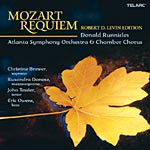
Requiem
 $35.09
Out of Stock
$35.09
Out of Stock6+ weeks add to cart
W.A. MOZART
Requiem
Christine Brewer. Ruxandra Donose. John Tessier. Eric Owens. Atlanta Symphony Orchestra and Chamber Chorus. Donald Runnicles
[ Telarc SACD / SACD ]
Release Date: Saturday 15 October 2005
This item is currently out of stock. It may take 6 or more weeks to obtain from when you place your order as this is a specialist product.
As the 250th anniversary of Mozart's birth approaches, Telarc releases a recording of the Robert D. Levin edition of Mozart's Requiem,K.626, by the Atlanta Symphony Orchestra and Chamber Chorus.
Hybrid SACD Compatible with all CD players. Includes high density stereo and surround tracks that can be read by SACD players.
As the 250th anniversary of Mozart's birth approaches, Telarc releases a recording of the Robert D. Levin edition of Mozart's Requiem,K.626, by the Atlanta Symphony Orchestra and Chamber Chorus. The Requiem, Mozart's final work and one that has long been shrouded in mystery, is conducted by the orchestra's Principal Guest Conductor Donald Runnicles with four outstanding soloists: soprano Christine Brewer, mezzo-soprano Ruxandra Donose, tenor John Tessier and bass Eric Owens. When the work was recorded at Atlanta Symphony Hall at the Woodruff in January, the Atlanta Journal Constitution praised Runnicles for drawing "exquisite sounds" from the orchestra and chorus.
Unfinished at the time of Mozart's death in 1791, the Requiem was completed posthumously by the composer's former pupil, Franz Xaver Süssmayr. Because Mozart himself went over the work in detail with Süssmayr before he died, the Süssmayr version has been accepted as closest to Mozart's wishes, but many musicians and musicologists have attacked his contribution as not sufficiently Mozartean in style, with orchestrations too heavy, modulations labored, and parts riddled with mistakes. Several revisions have been published over the years, including the version heard on this recording, a "re-completion" of the Requiem in 1993 by Robert D. Levin, who endeavored to improve Süssmayr's work rather than replace it.
"The traditional version has been retained insofar as it agrees with idiomatic Mozartean practice," Levin explains. Levin pared back the orchestra so that the vocal parts could be heard better, and most significantly, he furnished an "Amen" fugue to follow the "Lacrimosa," from a sketch in Mozart's hand that was not incorporated into the Süssmayr version.
This recording of Mozart's Requiem is the second Telarc album of the work by the Atlanta Symphony Orchestra and Chorus. The first, conducted by former ASO Music Director Robert Shaw in 1986, was a recording of the Franz Beyer edition.
Donald Runnicles has conducted the Atlanta Symphony Orchestra and Chorus in two previous Telarc recordings: Carmina Burana ("This lively, lusty, stunningly recorded new Carmina Burana goes right to the top of the heap," wrote ClassicsToday.com) and Beethoven Symphony No. 9 ("The ASO played splendidly throughout this performance," wrote Fanfare). Principal Guest Conductor of the Atlanta Symphony Orchestra since 2003, Runnicles is one-half of the ASO's Creative Partnership with Music Director Robert Spano, participating fully in the recording, choral, chamber music, and educational activities of the orchestra. On October 27, 2005, the chorus will join Runnicles and the Orchestra of St. Luke's at Carnegie Hall for a performance of the Mozart Requiem.
One of today's most consistently acclaimed conductors of opera and symphonic repertoire, Runnicles is also Principal Conductor of the Orchestra of St. Luke's and has been Music Director of the San Francisco Opera since 1992, leading more than 40 productions, including world premieres of Conrad Susa's Dangerous Liaisons and Michael Korie and Stewart Wallace's Harvey Milk, which he also recorded.
Celebrating its 60th anniversary in the 2004-05 season, the Atlanta Symphony Orchestra has enjoyed a long and fruitful relationship with Telarc. This past February, the ASO was recognized with two new Grammy Awards (Best Choral Performance for Berlioz Requiem and Best Engineered Classical Album for Higdon's City Scape and Concerto for Orchestra), bringing the total number to 23 wins. In addition to the Mozart Requiem, Telarc will release another disc by the Atlanta Symphony Orchestra and Chorus under Maestro Spano in October 2005: world premiere performances of two ASO commissions—Christopher Theofanidis' The Here and Now (based on poems of Rumi) and David Del Tredici's Paul Revere's Ride (based on the Longfellow poem) and Leonard Bernstein's Lamentation from Jeremiah.
Under Director of Choruses Norman Mackenzie, the Atlanta Symphony Orchestra Chamber Chorus has been acclaimed for the beauty, precision and expressive qualities of its singing. It is composed of forty to sixty volunteers selected by audition from the ranks of the full ASO Chorus. Mackenzie worked closely with founder Robert Shaw for fourteen years, and has introduced Shaw's vision to a new generation.
American soprano Christine Brewer's appearances in opera, concert and recital are marked with her own unique timbre, at once warm and brilliant, combined with a vibrant personality and emotional honesty. Romanian mezzo-soprano Ruxandra Donose has captured critical and popular acclaim in leading opera houses and concert halls. Her expressive vocalism, thoughtful musicianship and elegant stage presence allow her to pursue an extensive operatic and orchestral career here and abroad. Canadian tenor John Tessier appears on opera, concert, and recital stages throughout the world, winning praise for the beauty and honesty of his voice, a refined style, and artistic versatility. American bass Eric Owens, winner of the 2003 Marian Anderson Award, is a frequent guest artist with major orchestras in America and Europe and made his Atlanta Symphony Orchestra debut in John Adams's El Niño.



